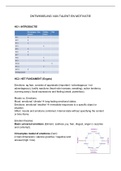ONTWIKKELING VAN TALENT EN MOTIVATIE
HC1: INTRODUCTIE
HC2: HET FUNDAMENT (Engels)
Emotions: eg fear; consists of appraisals (important / advantageous / not
advantageous), bodily reactions (heart rate increase, sweating), action tendency
(running away), facial expressions and feeling (weak, powerless).
Moods vs. Emotions:
Mood: emotional ‘climate’ long-lasting emotional states.
Emotions: emotional ‘weather’ immediate responses to a specific object or
situation.
Affect: moods and emotions combined. Internal state without specifying the content
or time frame.
Emotion theories:
Basic universal emotions (Ekman): sadness, joy, fear, disgust, anger (+ surprise
and contempt).
Circumplex model of emotions (Carr):
2 main dimensions: valence (positive / negative) and
arousal (high / low).
,Positive and negative emotions:
Emotions are often seen on a spectrum from negative to positive. Recently they are
seen as more independent (decrease in neg. Emotions does not always mean
increase in pos. Emotions). Individual differences in people are very important.
People who have more independent positive and negative emotions tend to also
have lower depression rates. So independent positive and negative emotions is
beneficial. (But research evidence is mixed).
Positivity ratio: Fredrickson’s positivity ratio says that an ideal ratio between positive
and negative emotions is 3:1.
Biological, cognitive and behavioural factors that affect our emotions:
Biology:
- Neurotransmitters: dopamine, serotonine, endorphins, oxytocine.
o Dopamine : the pleasure NT (pleasure, movement, motivation, etc.)
Recently it was discovered that dopamine did not play a big role in
reward, but in anticipation of reward (wanting). (Oxytocin is for reward.)
o Endorphins: increase pleasure, decrease pain (excercise, excitement,
sex). The ‘runner’s high’, feeling of euphoria.
- Brain: left prefrontal cortex more activated when happy.
o Genes: around 40% of variance in happiness is caused by genetics.
Cognition: the way we think and evaluate things.
The way we think impacts how we feel. The appraisal part of an emotion is relevant
here. If we evaluate something as unbeneficial, we will feel negative about it.
For example: someone doesn’t say hi ‘ignored me’ ‘they don’t like me’ sad.
But you can also think of it another way, for example that the person didn’t see you in
the street. learned optimism (Seligman).
Behaviour: how we act and behave influences how we feel.
For example: if someone in a group assignment is negligent and delivers poor work.
Unhealthy coping: complaining about it to friends, doing the work yourself, etc...
Assertive communication: actively try to change people’s behaviour by confrontation
(positively).
Characteristics of positive behaviour:
- Character: how we behave in a society
o Character strengths: different from talent (which is fixed), can be
cultivated, involve the will, valued across time and culture, morally
valued, can be measured, not just the opposite of negative traits.
o Can be measured using Peterson & Seligman classification system.
, This divides 6 character strengths everyone possesses on a different
level: wisdom, courage, humanity, transcendence, justice, moderation.
The positive traits you very strongly possess are called the signature
strenghts.
However, there is some critique on this theory. Some strengths may
only be expressed in rare circumstances, and not much is known about
their longitudinal development.
Pt. 2:
Emotional intelligence: emotional ability model
Motivation:
Relevant for positive psychology because people need to be motivated to flourish
and work on their goals.
Definition: psychological processes that cause the arousal, direction, and persistence
of voluntary actions that are goal directed.
Self-determination theory: suggests that people are motivated to grow and change
by 3 innate psychological needs:
- Relatedness: need for mutually supportive interpersonal relationships
- Competence: need for mastery of experiences, allows a person to deal
effectively with environment.
- Autonomy: need to make independent decisions about areas in life important
to the person.
Types of motivators: intrinsic vs extrinsic motivators:
Intrinsic: from within, not for external reward.
Extrinsic: come from outside and are controlled. We act in a certain way to obtain an
external reward.
Organismic intergration theory: different types of extrinsic motivation:
- External regulation: doing something because you will be punished otherwise.
- Introjected regulation: doing something because you would feel a certain way
if you wouldn’t do it.
- Identified regulation: doing something because the results of the behaviour will
be positive.
- Integrated regulation: doing something because you accept the importance
and value of the behaviour.
The intrinsic motivation: doing something because you see the value of the
behaviour.
Advantages of intrinsic over extrinsic motivation: positive link with health, work,
parenting, education, close relationships. Enhancement in performance, creativity,




